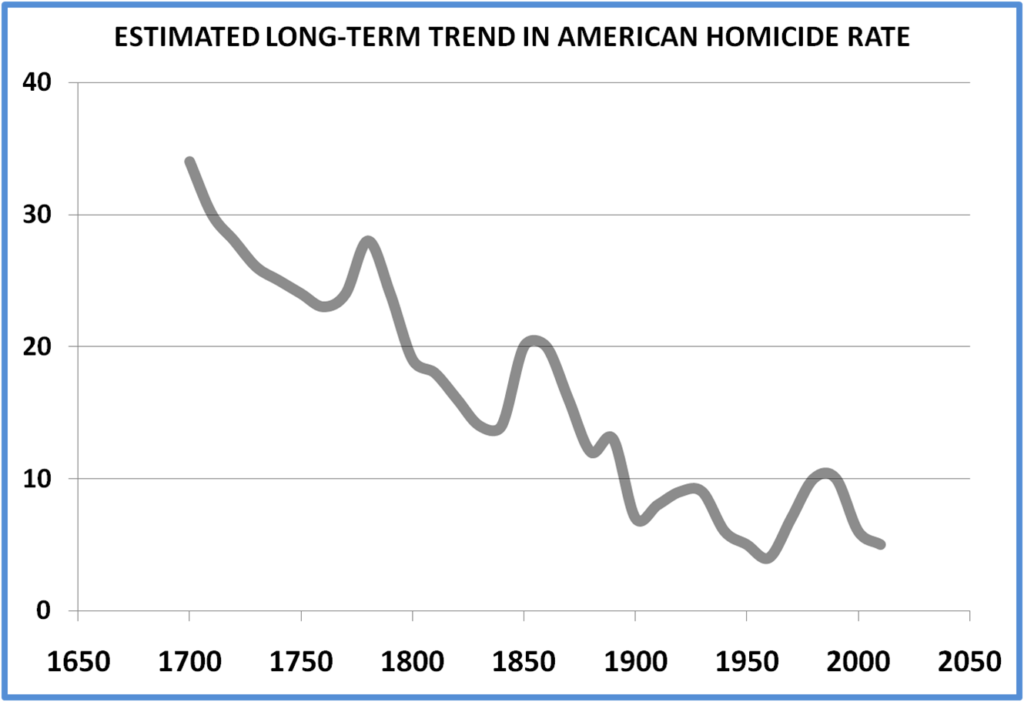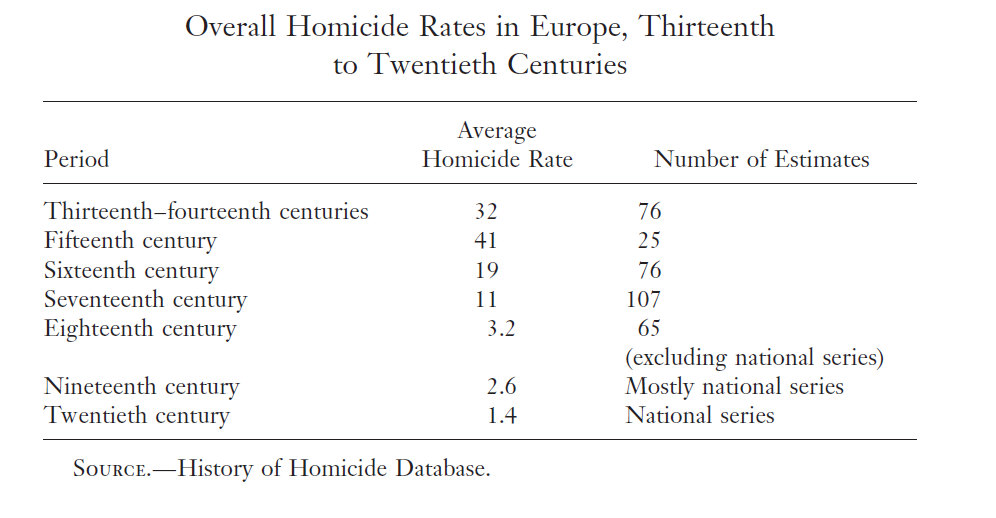An article from last August in the Guardian noted this (bold - my emphasis):
In 2009, New York City had the lowest number of murders since detailed FBI records began in 1963. There was a small increase last year but even so the total of 536 homicide victims was still well below the 2,245 murdered in 1990 when Times Square was infamous for peep shows and drug pushers, not the Disney Store.and, statistics which support that it is not having MORE guns which reduces crime:
Twenty years ago, the murder rate for the whole US was 9.8 per 100,000 people. It has fallen by nearly half, although it is still twice the rate in France.
Anti-gun activists note that the cities with two of the sharpest falls in murder rates, New York and Washington, have enacted strict gun control laws by US standards. Yet Houston in Texas, where some regard it as criminal not to own a gun, has also seen a sharp drop in homicides.and from the Guardian article on length of prison sentences reducing crime - this one is for our new friend Crunchy:
But Wilson adds that cannot be the sole explanation [length of jail sentences], as Canada has experienced roughly the same decline in crime without the same lengthening of prison sentences.Now on to the Marginal Revolution site post:
Here is a graph of American homicide rates, the earlier results should be taken with a grain of salt of course, but the trend is clear. N.B. These rates are per 100,000.Long Term Trends in Homicide Rates
The American data is consistent with European data. Here is Table 2 from Manuel Eisner’s Long-Term Historical Trends in Violent Crime. Do note that some correction should be made for the fact that violence is less lethal when people are healthier and medical care is more effective.
The bottom line is that there has been a big and welcome decrease in homicide rates in Europe and America over the past several centuries. To put these numbers in perspective, however, note that the homicide rate in New Orleans today is 52 per 100,000 and in Detroit it’s 40 per 100,000 so even with a lower average there is lots of variation. Brazil today is around 22 per 100,000 not too far from America in the 19th century. The homicide rate in El Salvador is 71 per 100,000, in Jamaica (!) 60 per 100,000 and in Honduras 67 per 100,000 — all higher than fifteenth century Europe. Thus, the past was a more violent place but not so violent as to be unknown to the present.


I couldn't really follow what you're saying. And I publish scientific research for a living. It is simply a case of the evidence - not just not supporting - but having nothing to do with your conclusion.
ReplyDeleteThe post reminds me of zoolander... "they'll recognize us, but they won't recognize... not us!"
In other words, guns have no effect on crime--positive or negative. Doesn't that suggest that your obsession with getting rid of guns makes no sense? Crime rates in general and homicide rates in particular are falling. Guns aren't stopping that decline. As was pointed out, Houston has seen a drop in homicide rates, despite much greater gun ownership than New York. This leads me to understand that something else is at work. That being the case, leave us gun owners alone. Your numbers don't support gun control.
ReplyDeleteWe all know the cause of crime and why the US has such a high deathrate from firearms.
ReplyDeleteIt's pixies!
No, you are the two best reasons for gun control!
So if we do put these numbers in perspective:
ReplyDelete"It has fallen by nearly half, although it is still twice the rate in France."
You claim France has half the murder rate per 100,000 than the U.S. However, since France has a gun ownership rate of 31.2 per 100,000 and the U.S. has an ownership rate of 88.8 per 100k that means that if you consider the rate of murders per gun owned, then France has 16% and the U.S. has 11%. That means that you are 45% more likely to be a gun homicide victim in France than in the U.S. or should mean that if the homicide rate had any real correlation with gun ownership.
So we are just safer with our guns then they are? :)
If guns really have such an impact on these stats then why do the murder rates not follow the rates of gun ownership? Should they not track the same? If fewer guns are the cause of reduced homicide why would they not be at least similar rates? If more guns are the cause of increased homicide, would not the rates be the same?
The UK's gun ownership rate is 6.2. Shouldn't their murder rate be only 7% of ours instead of a little less than 1/2?
Secondly, if gun availability is such an enormous factor, why have we seen such a drop in homicide rates in the U.S. with the relation of gun laws and increase in concealed carry? If you are correct, why would we not be at our all time highest?
The answer of course is that gun availability does not greatly impact murder. Either up, down or sideways, neither your side nor ours can really claim significance on a national scale.
FatWhiteMan,
ReplyDeleteYou've made a fundamental error in critical thinking: Numbers only matter when they agree with the gun control position. When they don't, they are simply being misunderstood.
Outstanding Laci (pixies)... I am beginning to see a humorous side to you. I am still laughing.
ReplyDeleteHouston has seen a drop in homicide rates, despite much greater gun ownership than New York.
ReplyDeleteAnd Chicago's crime rate has dropped even faster since the defeat of the gun ban........
https://portal.chicagopolice.org/portal/page/portal/ClearPath/News/Statistical%20Reports/Index%20Crime%20Statistics/2011%20Index%20Crime%20Statistics/mcsJune11.pdf
But don't bother their pretty little heads with those pesky ole facts now......
Since dog gone brought it up, I want to see some serious numbers. We can get several of the numbers from the FBI Uniform Crime reports. There may be no source for other numbers.
ReplyDeleteFor example, let's say by some magic we could eliminate all guns forever in the U.S. ... or eliminate guns from whomever the gun control side wants to eliminate. There were a total of 14,748 homicides reported to police departments in the U.S. in 2010. Of those, it looks like criminals used firearms in 67.5% for a total of 9959 firearm murders. And then there were 232 justifiable homicides where citizens used firearms in 2010. I don't have the exact suicide by firearm number handy but we will say that a reasonable estimate is that 17,000 people used a firearm to commit suicide in 2010. And then there were a handful of unintentional discharges. I don't have a number handy. A quick Google search revealed a couple different sources claiming something like 600 deaths. I have no idea if those are reliable but let's assume they are. So the total death toll due to firearms in the U.S. in 2010 was:
9959 + 232 + 17000 + 600 = 27791.
So even if we had eliminated guns in 2011, how many people would have died anyway? In other words how many lives would eliminating guns have saved?
Let me put it this way. Regardless of what it is now and what it used to be, wouldn't it be better if we could prevent unfit guys from getting guns? If it's improved anyway, great, but wouldn't it improve a lot more?
ReplyDeleteMikeb302000,
ReplyDeleteYou have yet to convince me that your proposals would keep "unfit" people from getting guns. You have also yet to convince me that your proposals would not keep "fit" people from having and carrying them. That being the case, I'm not willing to go along, just to see what might happen.
Greg, I'm afraid the diagnosis is in on you and it's terminal. You are unconvinceable, impenetrable and wrong.
ReplyDelete